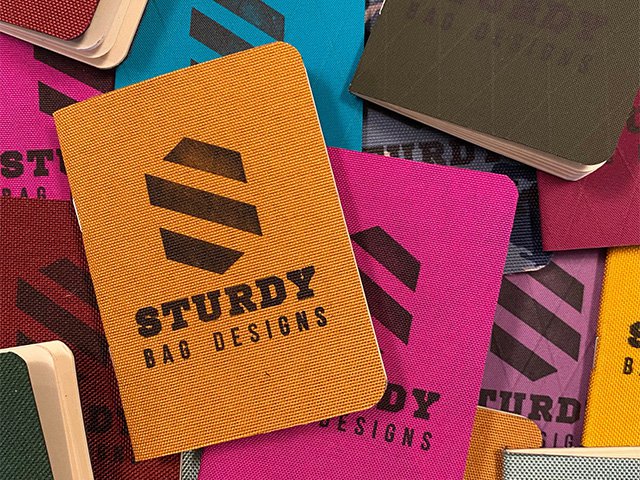Mordecai Book Building is a one-man bookmaking shop just west of Middleton. It’s on the edge of the Driftless, in a house that began life as a stone school in 1861. There are fields out front, yet it’s just minutes from Highway 14. The small operation can seem both spare and, in the way of print shops, cluttered.
Founder Tobie DePauw owns a number of vintage presses, including a Vandercook No. 4 letterpress and a Golding Pearl from around 1895. “It’s a beautiful little machine, relatively fast and increasingly rare,” says DePauw of the Pearl. The Vandercook works via a crank, the Pearl via a pedal. With them, he makes custom books for businesses and individuals. He also does some hand binding and repair of antique plat books and Bibles.
DePauw learned bookbinding in an unconventional way. “My undergrad experience was part philosophy, part media studies, part sociology,” he says. During a college trip to San Jose, Puerto Rico, in 2000, he was introduced to a bindery in a church that functioned as a community job skill center. He was so impressed that two years later, he returned to work there for a year.
He learned a lot from those artisans. “They were very scrappy, no pun intended. They built a lot of their own tools. And they were very resourceful.”
When DePauw returned to the U.S. he wanted to continue bookbinding, and was surprised to learn that here it was rare and expensive. He started out at a college library recasing books, moved on to rebinding Bibles and family keepsakes, then started looking for used equipment to start producing books on his own.
He found his presses from small printers who were retiring and were “happy there was someone to take it,” he says. He’s gotten his type cabinets “for a fraction of the cost” in similar situations: “When I see type, I try to claim it so it doesn’t go to waste.” Letterpress type is becoming increasingly rare as people use it for jewelry or other crafts, or just melt it down.
Much of his enthusiasm these days is directed toward what he calls pocket books — notebooks with covers he prints on vintage papers that he scouts at antique shops and garage sales, or scrap paper he collects from printmakers who have to run many trial sheets. Sometimes the pocket books are blank, sometimes they have a more specific function — bicycle ride logs, running ledgers or wine list notebooks.
“The pocket book style resonated with me,” he says. “It’s tactile, it’s fun. It’s affordable.” DePauw terms his pocket books “pedestrian” — but in a good way — unique, carefully made books that aren’t so precious that people don’t want to use them.
DePauw also makes small runs of custom books, which he calls micropublishing. He’s worked with a spa that published seasonal herbal recipes, a dog obedience school with a book of best practices, and a band that put out a record release companion book with lyrics and stories.“I find a lot of joy in seeing these ideas come to life,” says DePauw. “Publishing can be an intimidating word, so I tie this back to the DIY ethic of ‘Let’s just build it. Let’s just write it.’”
He’s also published a couple books of his own; one, “Idle Hand Book,” is full of puzzles; another is a collection of what he terms two-word stories, made from provocative phrases he’d been collecting for years. Many of his micropublishing jobs come from bike shops, which print maintenance and repair guides. This brings DePauw’s day job with the Madison-based app Ride Spot (which matches bicyclists with bike rides suited to their interests and skill levels) together with his printing avocation.
While most of DePauw’s work is custom orders, he sells some books at The Regal Find, 1834 Parmenter St. in Middleton.
DePauw isn’t trained as a designer, but he came up with the Mordecai brand, a geometric depiction of a stack of books with an open book on top, himself: “My brand is intentionally Spartan. I like clean.” He does some linocuts, too: “I have a lot of experience just figuring it out.”
He particularly likes letterpress. “It adds that tactile appeal. People can see it’s different from a laser printer or offset press. You see a reflection [on the ink] and you want to touch it.”
This summer, DePauw will be moving the bindery from the cozy, L-shaped studio at the front of his house to his garage, as he acquires a larger press, a Heidelberg Windmill, from a retired printer in Milwaukee. Currently he can print 200-300 covers an hour with the Vandercook, “depending on how much energy I have;” the Windmill will allow for 2,000-3,000 per hour. “It’s more automated, a more complex machine, in that it has suction, lifts paper, and puts it in the tray, and so on.”
DePauw toured the Milwaukee printer’s shop a few years ago out of curiosity, and more recently, called the man to see if he would be able to help him with a print run for a bike guide that was too large for his current equipment. They worked out a deal — the printer, who had retired, would help him print the run, with the agreement that DePauw would buy his equipment — which includes not one but two Heidelbergs. The move of the equipment to Middleton is going to be a big project. The Heidelbergs are “very heavy,” says DePauw, who will be re-selling the second press and some of the other equipment he won’t need.
DePauw says he senses a market in larger customers interested in projects like the bike manuals, not just the smaller bike shops. “That’s why I’m excited to invest in this new press and scale up a little bit.”
Eventually, DePauw wants to use his new bigger print space to host hands-on printing workshops. “I’m interested in teaching and passing on the knowledge now,” he says.


